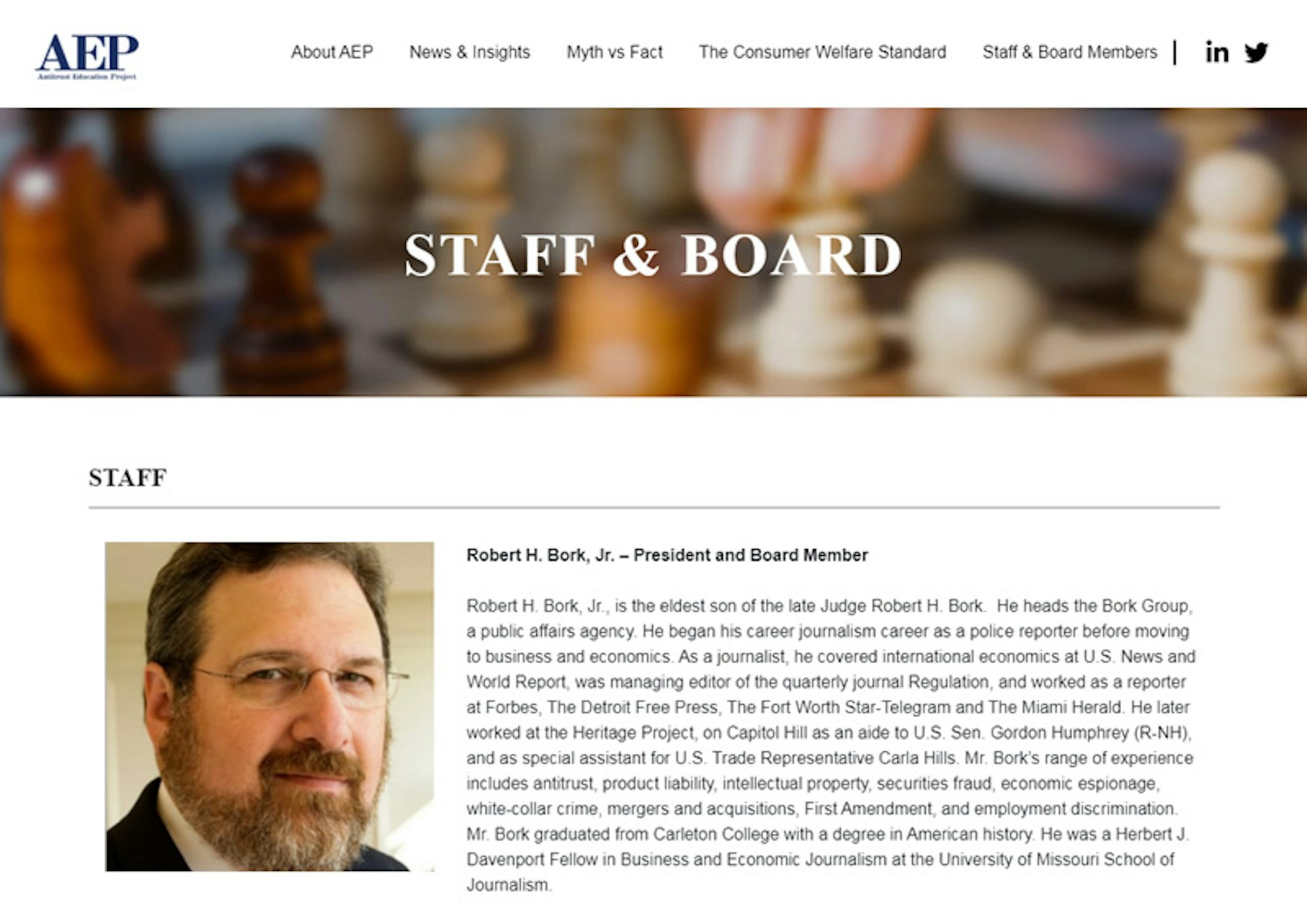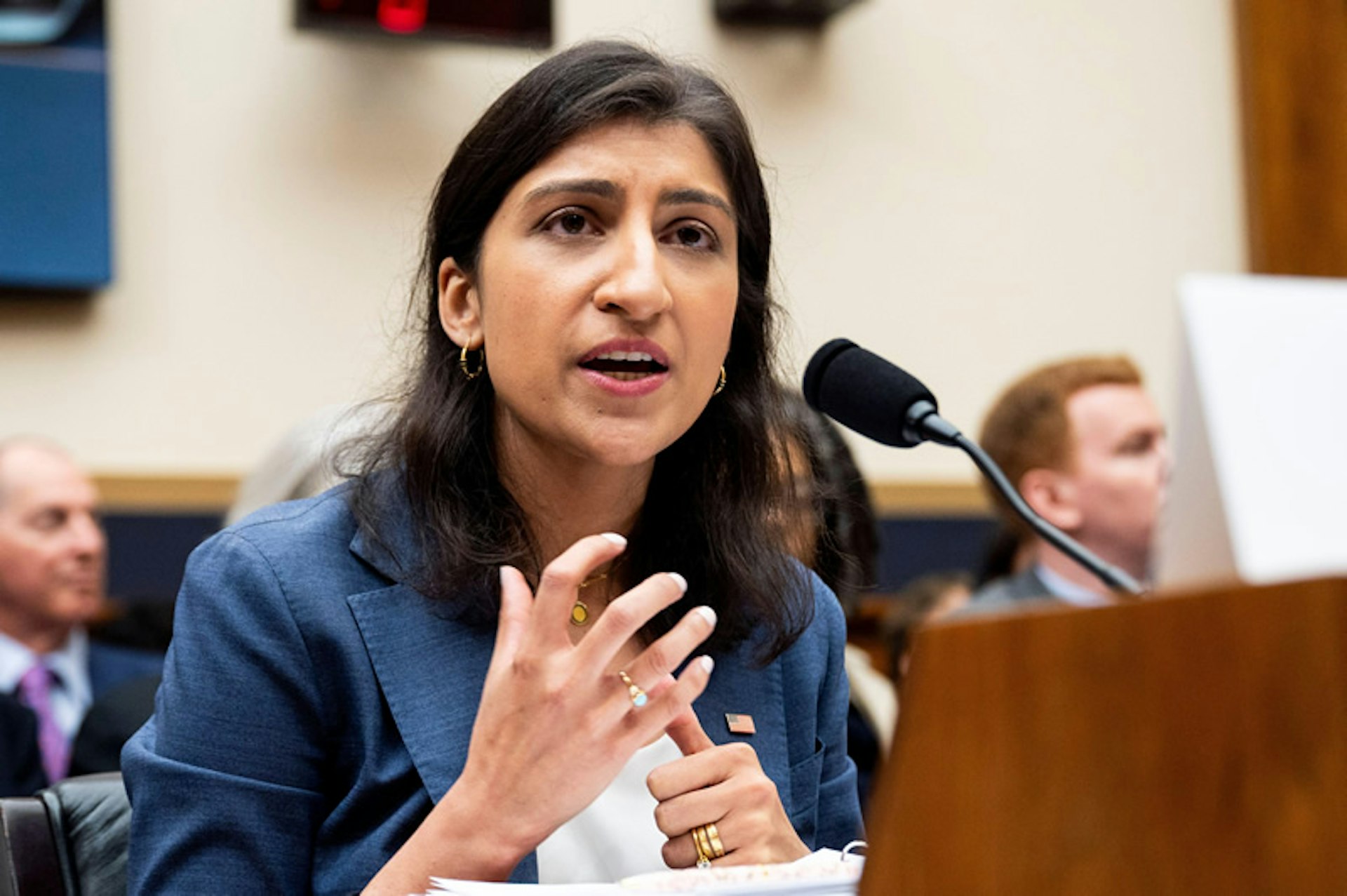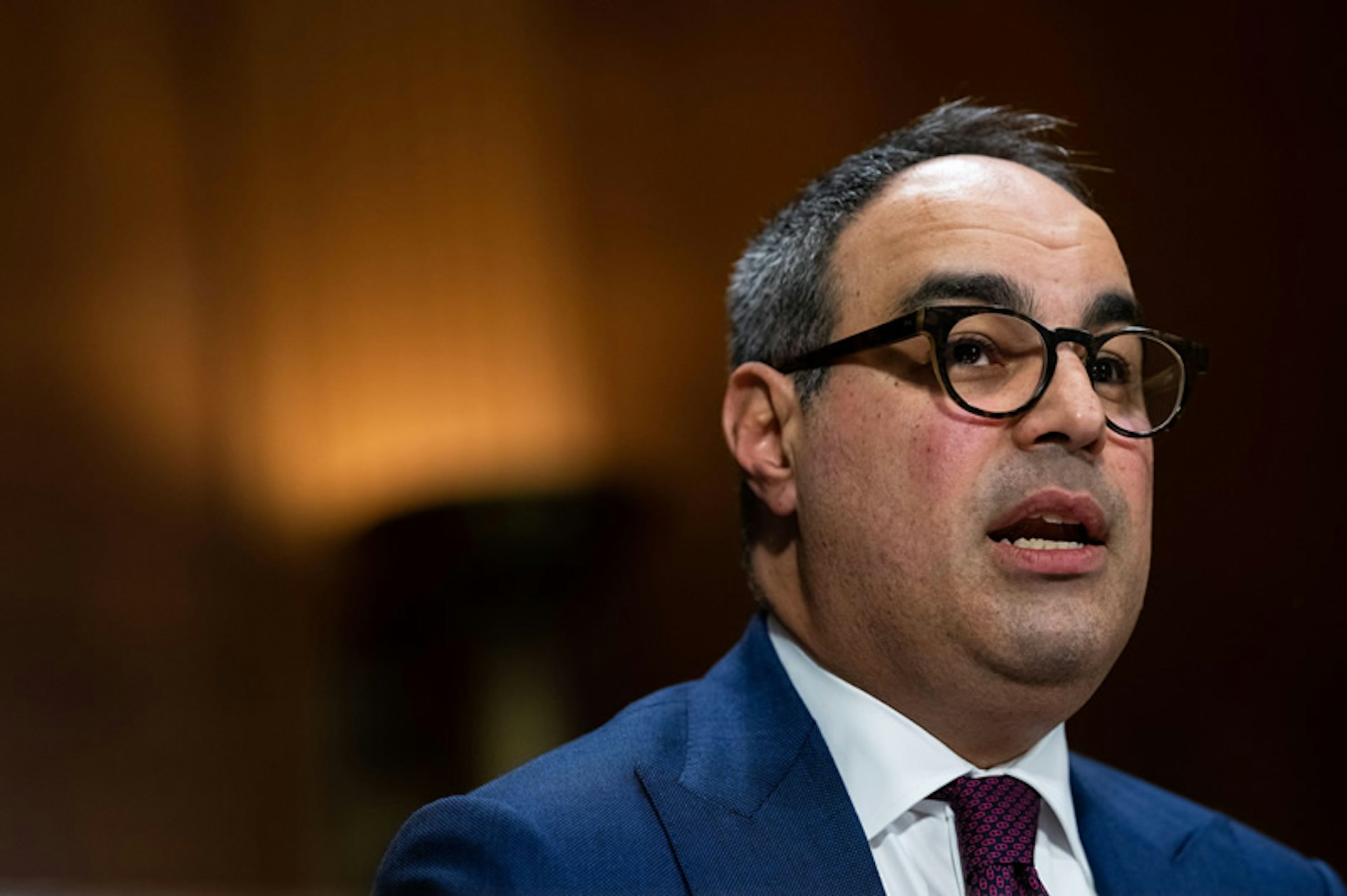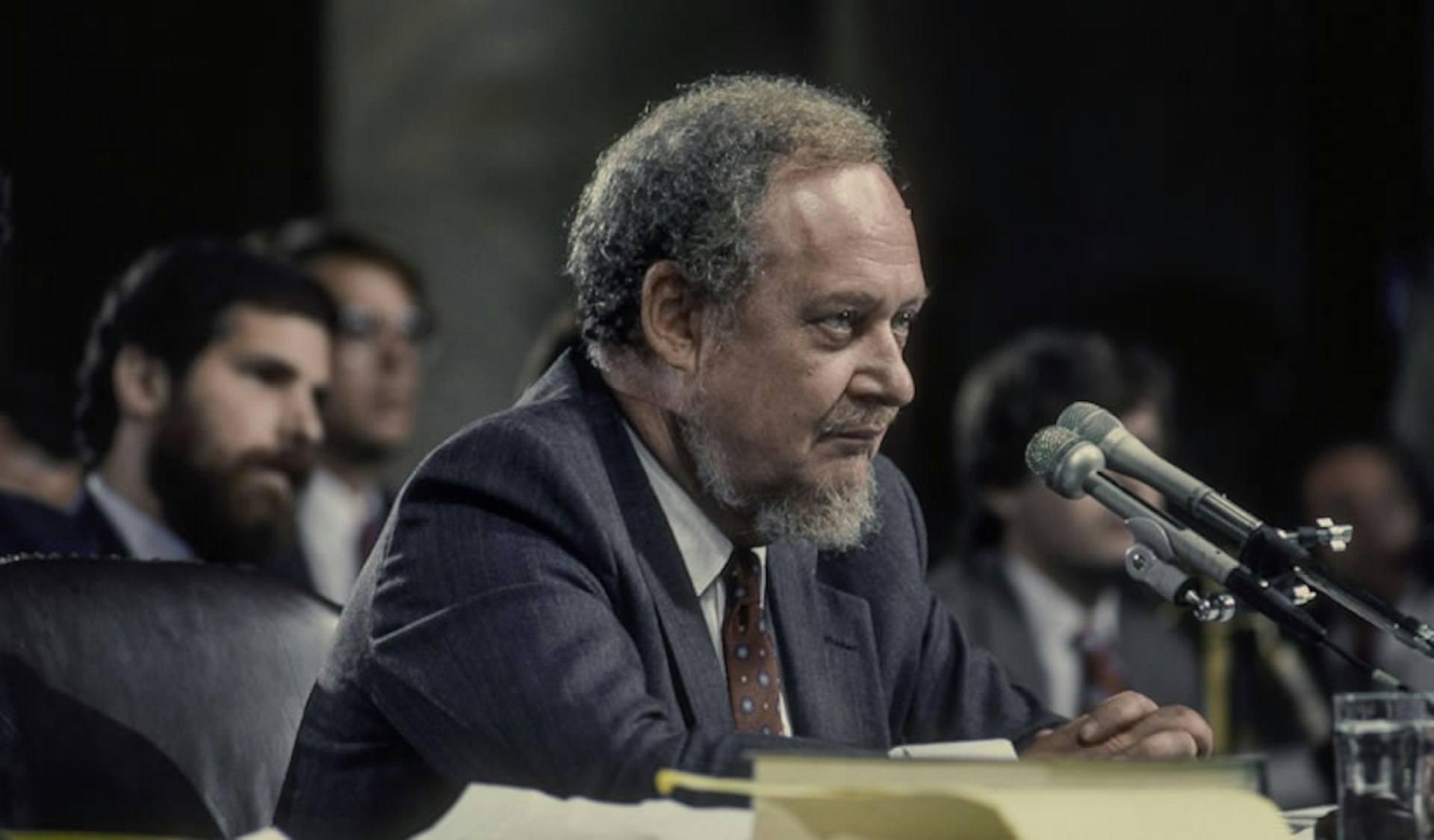As Amazon and Google mount a wide-ranging defense against regulators in Washington, they’re getting help from an iconic name in conservative circles: Robert Bork.
Robert Bork Jr., the son of the late Supreme Court nominee, has emerged as an aggressive critic of the Biden administration’s tech regulators and attacked Republicans for supporting "woke" tech reform legislation. Amazon and Google are closely connected to his work: Amazon funds Bork’s advocacy group, the Antitrust Education Project, and Google has been a client of his public relations firm, the Bork Group.
Robert Bork Jr.'s name resonates with many Republicans who remain bitter about the treatment of his father, whose nomination to the Supreme Court was rejected by the Senate in 1987. It's also symbolic in the current debate over Big Tech. The elder Bork argued that companies are not a threat to competition if they offer lower prices—the so-called consumer welfare standard that’s become the foundation for modern U.S. antitrust law. Lina Khan, the Biden-nominated chair of Federal Trade Commission, has advocated for a broader consideration of Big Tech’s power, outlining a new antitrust approach in an influential academic article about Amazon.
Now Robert Bork Jr.—who has ties to Amazon and Google—is leading the charge against Khan and Jonathan Kanter, the antitrust chief of Biden’s Justice Department, while criticizing Republicans who make common cause with Democrats on reforming the tech industry. He’s become an important asset for Big Tech as it tries to weaken the hand of Biden’s regulators and prevent bipartisan action on tech in Congress.
Bork did not provide comment or answer questions emailed by TTP. The Daily Beast, which reported on TTP's findings, said that Amazon declined to comment and that Google said it no longer worked with the Bork Group without answering whether it supported his other efforts.
Painting Khan as ‘reckless and radical’
Robert Bork Jr. doesn’t appear to be a lawyer himself, but runs a PR firm for companies involved in litigation. He formed the Antitrust Education Project in January 2021 with Elliot Berke, a well-connected Washington lawyer who represents House Speaker Kevin McCarthy and other top Republicans in Congress. Berke serves as a board member and general counsel for the Antitrust Education Project, and Virginia public records indicate the group’s principal address is Berke’s law firm, Berke Farah LLP.
The Antitrust Education Project launched shortly before the reissue of the elder Bork's seminal book, “The Antitrust Paradox.” The project says it’s devoted to fighting the “recent deterioration of American antitrust theory” and defending the consumer welfare standard, which it warns is in danger of being replaced by a new wave of “vague, subjective and politicized” concepts.

Robert Bork Jr. heads the Antitrust Education Project, which is funded by Amazon and frequently attacks Biden administration regulators.
The group makes no mention of funding sources on its site, but it has at least one corporate backer: Amazon. Amazon gave “$10,000 or more” to the project in 2021 and 2022, according to corporate disclosures. Amazon doesn’t say exactly how much it donated to the group, but the company has shown a willingness to spend heavily on the antitrust fight in Washington. It reportedly gave more than $1 million to another Republican-leaning group, the Competitiveness Coalition, which is fighting antitrust legislation.
Robert Bork Jr. has a variety of connections to Big Tech. His litigation PR firm, Bork Group, has counted Google as a client. And the Antitrust Education Project advisory board is stacked with members who are closely linked to the tech industry. One is Joshua Wright, who until recently served as executive director of George Mason University’s Global Antitrust Institute, which is funded by Amazon, Google, and Meta, the parent company of Facebook and Instagram. (A previous TTP report revealed Wright's behind-the-scenes dealings at the FTC and and GMU's influence over the agency's workforce.)
Another advisory board member, Judge Douglas Ginsburg, is chair of the Global Antitrust Institute’s international board of advisors and a law professor at GMU. Ginsburg was nominated to the Supreme Court by President Ronald Reagan following the Senate’s rejection of Bork but withdrew after admitting he had smoked marijuana. Other advisory board members include Alden Abbott, a senior research fellow at GMU’s Mercatus Center, which is also funded by Amazon, Facebook, and Google, and Geoffrey Manne, president and founder of the International Center for Law & Economics, which gets financial support from the same set of tech companies.
One of the Antitrust Education Project’s primary activities is attacking Lina Khan, President Biden’s pick to lead the FTC. While in law school, Khan authored an influential 2017 Yale Law Journal article that proposed a new way to think about antitrust, using Amazon as a test case. The article—titled “Amazon’s Antitrust Paradox,” a direct reference to Robert Bork’s book, “The Antitrust Paradox”— sought to dismantle the logic behind the consumer welfare standard. Khan argued that Bork’s focus on economic efficiency doesn’t adequately capture the power of a dominant company like Amazon, and advocated for a broader focus on market structure and dynamics to assess anti-competitive conduct.

Lina Khan, chair of the Federal Trade Commission, has been a frequent target of Robert Bork Jr.’s Antitrust Education Project.
Robert Bork Jr. formed the Antitrust Education Project in January 2021, just days after Khan’s name emerged as a frontrunner for an open FTC seat, and he quickly began criticizing her. In a commentary published shortly before the Senate voted on her nomination, Bork described Khan as “a celebrity scholar recasting antitrust law as a tool to enable government to control capitalism,” and urged Republicans to vote against her. Khan was confirmed by a vote of 69-28, with 21 Republican senators voting in favor, and Biden immediately named her chair of the commission.
Since Khan’s confirmation, Bork’s attacks have only intensified. In a December 2021 blog post, he said Khan is overseeing an FTC where “social extremism is being injected into laws and regulations intended to enforce fair competition in our economy.” The Antitrust Education Project tweeted that she is pursuing a “reckless and radical antitrust agenda.” More recently, Bork has urged Congress to investigate Khan, describing her in a Wall Street Journal op-ed as a “Machiavellian who muddies transparent processes and trashes precedent by announcing surprise policy reversals.”
The Antitrust Education Project has tweeted about Khan more than 300 times, and its website features more than 30 blog posts and Bork op-eds excoriating her ideas and performance. Across these commentaries, Bork never discloses that his group is funded by Amazon. The Antitrust Education Project at one point promoted a website, aboutlinakhan.com, but the website is no longer active, and TTP was not able to evaluate its contents.
Geoffrey Manne—an advisory board member at the Antitrust Education Project and founder of the International Center for Law & Economics, which is funded by Amazon and other Big Tech companies—has also been a prolific critic of Khan. Manne has called the FTC chair “hostile” to the tech sector and “innovation generally,” and accused of her pursuing a “vendetta against tech” with an “an untethered, aggressive agency.”
Amazon, the Antitrust Education Project’s funder, clearly views Khan as a threat. Two weeks after Khan was confirmed and named chair of the FTC, Amazon pushed for her recusal on matters involving the company, arguing that she would be unable to keep an “open mind” given her past writings about the tech giant. Khan has shown no sign of recusing herself, and the FTC sued Amazon in May 2023 for failing to delete recordings of kids recorded by Alexa devices and failing to protect the privacy of Ring security camera customers. Amazon said it disagreed with the claims but settled, agreeing to pay more than $30 million in fines.
A month later, the FTC sued Amazon for enrolling people in its Prime subscription service without consent and making it hard to cancel the service. Amazon rejected the allegations, calling them “false on the facts and the law.” More FTC action may be coming. Bloomberg News reports the agency plans to file another antitrust lawsuit against Amazon, this time focused on its third-party seller marketplace.
(Amazon isn’t the only Big Tech company to seek a Khan recusal on the basis of her past comments. Meta, the parent company of Facebook, tried to disqualify Khan from an FTC case against the company’s acquisition of virtual reality startup Within Unlimited. Khan declined to recuse herself, though the agency later lost the case in court and withdrew the complaint.)
The Antitrust Education Project’s general counsel, Elliot Berke, is deeply connected to House Republicans, who have been ratcheting up criticism of Khan and launching investigations of her, amid conservative complaints about her regulatory efforts. Berke’s clients have included Speaker Kevin McCarthy and Rep. Cathy McMorris Rodgers (WA), chair of the House Energy & Commerce Committee, one of three GOP-led House panels scrutinizing Khan’s tenure at the FTC. At an April 13 hearing, McMorris Rodgers told Khan, “Time and time again you have prioritized a personal and political agenda over the integrity of the FTC and the interests of Americans.”
Berke helped set up another entity, the Bork Foundation, which is dedicated to promoting Robert Bork’s recently reissued book, “The Antitrust Paradox,” at events held by the Federalist Society and other conservative organizations. (The elder Bork was closely associated with the Federalist Society, having been a speaker at the organization’s first meeting in 1982.) The Bork Foundation has the same leadership structure as the Antitrust Education Project, with Robert Bork Jr. serving as president, Berke as general counsel, and nearly all of the same people on the advisory board. Virginia public records give its principal address as Berke’s law firm—the same address given for the Antitrust Education Project.
Targeting Kanter and a bipartisan tech bill
The Antitrust Education Project has focused much of its energy on Khan, but it has used a similar playbook against Jonathan Kanter, President Biden’s pick to head the Justice Department’s Antitrust Division.
The group has attacked Kanter dozens of times, starting when Biden nominated him for the DOJ role in July 2021. In a series of tweets that month, the Antitrust Education Project slammed Kanter for having a “public animus toward Google” and said his nomination showed that the Biden administration wants to “punish the companies that drive our economy.” In another tweet, the group referred to Khan, Kanter, and Tim Wu, then a special assistant to the president for competition and tech policy, as a “three-headed monster supporting populist delusions of how economics works.” At no time did the Antitrust Education Project disclose that Google was a client of Robert Bork Jr.’s PR firm—or that many of the group’s advisory board members work for organizations that have been funded by Google.
Following Kanter’s Senate confirmation, by a vote of 68-29, Google asked the Justice Department to investigate whether its new antitrust chief should recuse himself from litigation and investigations involving the company. The request cited Kanter’s “statements disparaging Google and his extensive representation of parties who are suing Google,” referring to his past legal work for Google critics like Yelp and the News Media Alliance. During this time, the Antitrust Education Project repeatedly questioned Kanter’s credentials, saying he “brings scant administrative and government experience in running a 700-person division” and “mirrors the inexperience of his ideological partner,” Lina Khan. The group also warned that he would join Khan and Wu in “shifting antitrust from a rational framework of toward incoherent ideologies.”

Bork Jr.’s group has also targeted Jonathan Kanter, head of the Antitrust Division at the Justice Department.
In January 2023, news emerged that the Justice Department cleared Kanter to work on cases involving Google, including an ongoing antitrust lawsuit filed by the Trump DOJ that accuses Google of maintaining an illegal monopoly in search. After Kanter got the OK to oversee matters involving Google, the DOJ filed another antitrust suit against the company, accusing it of monopolizing the digital advertising market. Within days, Robert Bork Jr. weighed in with an op-ed arguing the Biden Justice Department was off-base in targeting Google and hadn’t accounted for changing market dynamics. The search giant, he said, is “rapidly losing market share” and “facing the prospect of severe disruption from ChatGPT,” the popular AI chatbot. Bork described the DOJ as a “hapless Monty Python knight [that] always arrives late – and to the wrong battle.”
In defending Google, Robert Bork Jr. is following a similar path as his father. The elder Bork co-authored an academic paper in 2012 which concluded that “None of the purported antitrust problems that Google’s critics have raised indicates that Google is behaving anticompetitively.” A footnote indicates the paper was commissioned by Google.
In addition to attacking Biden regulators, Robert Bork Jr. has sought to peel Republicans away from bipartisan tech reform legislation. Last year, he did a series of opinion pieces and interviews in conservative media taking aim at GOP senators who joined Democrats in backing an antitrust bill called the American Innovation and Choice Online (AICO) Act, from Sen. Amy Klobuchar (D-MN). The measure would have barred large tech companies like Amazon, Apple, and Google from favoring their own products over those of competitors that rely on their platforms.
Shortly after Sen. Ted Cruz (R-TX) joined other members of the Senate Judiciary Committee in voting to advance AICO in early 2022, Bork asked why Cruz supported a bill that would “subject American business to socialism and make Big Tech social-media companies more woke and dedicated to the censorship of conservatives than ever before?” A few months later, Bork called out Cruz and four GOP co-sponsors of the bill—Sens. Chuck Grassley (IA), Lindsey Graham (SC), Josh Hawley (MO), and John Kennedy (LA)—warning that their “blind anger” at Big Tech could cause them to support legislation that would “degrade America’s remaining technological edge” and “turn America’s most innovative companies into public utilities.”
Amazon, the funder of Bork’s Antitrust Education Project, had a lot at stake with the AICO bill. The measure would have prevented tech companies from using their platforms to disadvantage competitors, meaning Amazon couldn’t promote its own house-brand kitchenware, furniture, and clothing above those of third-party sellers on its website. Amazon mounted a campaign to kill the legislation, saying it could cause “serious and damaging unintended consequences for American consumers and small businesses the bills purport to protect.” The company encouraged its third-party sellers to contact senators to oppose the bill, and its CEO, Andy Jassy, was among tech CEOs who personally urged lawmakers to oppose the measure.
In the end, the massive influence campaign by Amazon and other Big Tech companies succeeded in killing AICO and other tech reform bills during the last Congress.
Bork launched a similar campaign against a previous Klobuchar bill, saying at an April 2021 Federalist Society forum that the measure could lead to the “end of capitalism as we know it under the guise of antitrust law.” He added, “I understand why Republican senators are angry, but destroying American capitalism is an extremist approach to getting back at woke social media companies.” Bork appeared to be referring to the Competition and Antitrust Law Enforcement Reform Act, a bill to create stricter standards for evaluating mergers, which Klobuchar introduced in Feb. 2021. News reports at the time suggested the proposal could draw interest from Republicans like Hawley, who wanted to ban tech mergers and acquisitions. (The bill ultimately stalled.)
Bork and the Antitrust Project appear to be well integrated into the ecosystem of Big Tech-funded trade groups and associations that promote the industry’s interests in Washington. For example, NetChoice, the trade group funded by Amazon, Google, Meta, and other tech platforms, has featured Bork in at least two antitrust events and amplified his quotes, opinion pieces, and messaging on Twitter (now known as X). The Springboard Initiative, a research arm of the Big Tech-funded Computer & Communications Industry Association (CCIA), has reliably promoted Antitrust Education Project surveys, blog posts, and events.
Bork signed a letter opposing a package of House tech reform bills in 2021 alongside a number of other Big Tech-backed conservative groups including the Competitive Enterprise Institute, Americans for Tax Reform, Independent Women’s Forum, R Street Institute, and the Taxpayers Protection Alliance.
Harris Media, the right-wing digital strategy firm, appears to have a role in running the Antitrust Education Project website. Metadata from the site reveals two names that correspond with current and former employees of Harris Media. Harris Media worked at one point for Donald Trump’s 2016 presidential campaign and has consulted for far-right politicians in Europe, including France’s Marine Le Pen.




